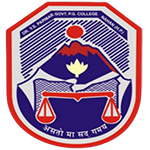Department of Physics
The Physics Department at Dr. Y.S. Parmar Govt. PG College Nahan traces its origins back to the esteemed year of 1977, aligning with the inception of the institution. As a pioneering department, it was established to cater to the educational needs of students in this region, aiming to impart a comprehensive understanding of experimental and theoretical physics at the highest level.
Our primary objective is to educate and train undergraduates across the complete spectrum of physics, fostering their overall development to meet national standards and cultivating problem-solving abilities through imaginative solutions. Following the syllabus prescribed by Himachal Pradesh University, Shimla, we offer a curriculum that challenges students, nurturing their enthusiasm and ingenuity.
At present, the department is led by three dedicated Assistant Professors. Students engage with the faculty in an intellectually stimulating environment, where both basic courses and skill enhancement courses are integral parts of the three-degree program. Furthermore, the college provides a platform for students to showcase their prowess in national-level competitions such as the National Graduate Physics Examination (NGPE) organized by the Indian Association of Physics Teachers (IAPT) every January.
The erudite and passionate faculty members bring their subjects to life, leveraging creativity and modern technology in their teaching methodologies. Upholding a commitment to excellence, the department employs a rigorous academic approach, conducting periodic tests, quizzes, seminars, and lab projects. The laboratories are thoughtfully equipped with a range of advanced instruments such as spectrophotometers, conductometers, pH meters, electronic balances, furnaces, and computers. Additionally, there is an ample supply of glass apparatus and essential chemicals.
Students are exposed to both theoretical insights and practical expertise in handling chemicals, fostering a robust foundation in the realm of chemistry. The teaching and learning process places significant emphasis on cultivating a scientific temperament and honing analytical problem-solving skills among the student body.
ACADEMIC YEAR ENROLLMENTS
| ACADEMIC YEAR | ENROLLMENTS |
|---|---|
| 1st Year | 111 |
| 2nd Year | 111 |
| 3rd Year | 111 |
Eigibility Criteria
| Programme/Course/Level | Duration | Eligibility | Adimission Procedure |
|---|---|---|---|
| B.Sc. / UG | 3 Years | 10+2 | On merit basis |
Smt. Richa
Sh. Sudesh Kumar
Assistant Professor
Dr. Anoop Kumar
| Name | Designation | Teaching Experience | Mobile | |
|---|---|---|---|---|
| Smt. Richa | Assistant Professor | 10 Years | – | – |
| Sh. Sudesh Kumar | Assistant Professor | 10 Years | – | – |
| Dr. Anoop Kumar | Assistant Professor |
Courses offered in the Department
| YEAR | DISCIPLINE SPECIFIC COURSES (DSC) | SKILL ENHANCEMENT COURSES (SEC) | DISCIPLINE SPECIFIC ELECTIVES (DSE) |
|---|---|---|---|
| B.Sc. 1st Year | 1. Mechanics PHYS 101 2. Electricity and Magnetism PHYS 102 |
||
| B.Sc. 2nd Year | 1. Statistical Physics and thermodynamics PHYS201TH 2. Waves and optics PHYS202TH |
3. Physics Workshop Skill. PHYS 203 4. Electrical circuits and networking skills. PHYS205 |
|
| B.Sc. 3rd Year | 1. Radiation safety. PHYS307 2. Renewable energy and energy harvesting. PHYS310 |
3. Solid state physics and electronics. PHYS302TH 4. Nuclear and particle physics PHYS304TH |
Course Outcome
| NAME OF COURSE | OUTCOMES |
|---|---|
| Mechanics PHYS 101 | This course contains different coordinate systems and their transformations. Also give knowledge of special theory of relativity. |
| Electricity and Magnetism PHYS 102 | This course explores theories and applications of electricity and magnetism. Electrostatics, Concepts of moving charges, current and study of electromagnetic waves makes whole very interesting. |
| Statistical Physics and thermodynamics PHYS201TH | This course takes mathematical based theories of dealing a large numbers of particles. Also takes thermodynamically aspects of physics |
| Waves and optics PHYS202TH | This course deals with waves and their mathematical solutions. Optics part is based on experimental activities. |
| Physics Workshop Skill. PHYS 203 | This is a skill based course and gives detailed study of tools and apparatuses of physics laboratory. It is a project based activity course. |
| Computational Physics. PHYS 204 | This course develops interest to identify the modern programming methods and help to describe the characteristics of various numerical methods. This course combines computer science, physics and applied mathematics to develop scientific solutions to complex problems. |
| Electrical circuits and networking skills. PHYS205 | This is a skill based course aims to give detail knowledge of electrical components and theorems based on voltage and current. |
| Elements of modern physics. PHYS301 | It explores the nature of the microscopic and great relativistic world. It also emphasises on mathematical, experimental and computational techniques. This course generates fundamental knowledge needed for the future discoveries and technologies. |
| Solid state physics and electronics. PHYS302TH | This course reveals the structure and properties of solids using various methods and techniques. Electronics part contains basic electronic devices and its applications |
| Nuclear and particle physics PHYS304TH | Nuclear physics reveals basic theories and their experimental verifications of facts about nuclei. Nuclear configurations, moments and reactions are discussed. |
| Radiation safety. PHYS307 | It’s a skill based course which gives knowledge about effects of harmful radiations in our day to day life and provide safety measures. |
| Renewable energy and energy harvesting. PHYS310 | Its again a skill based course which comprise of renewable natural energy sources like sun ,wind ,ocean ,tides ,waves etc and study techniques to use them. |

